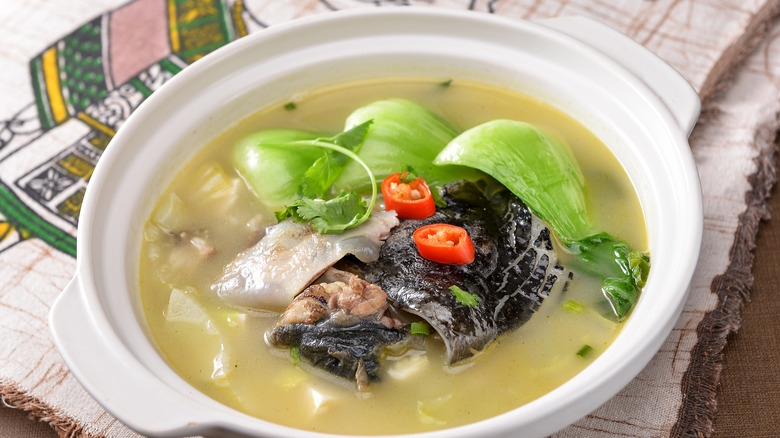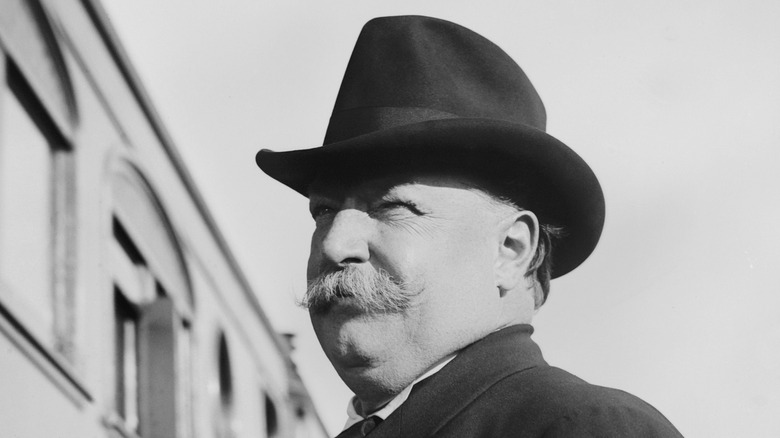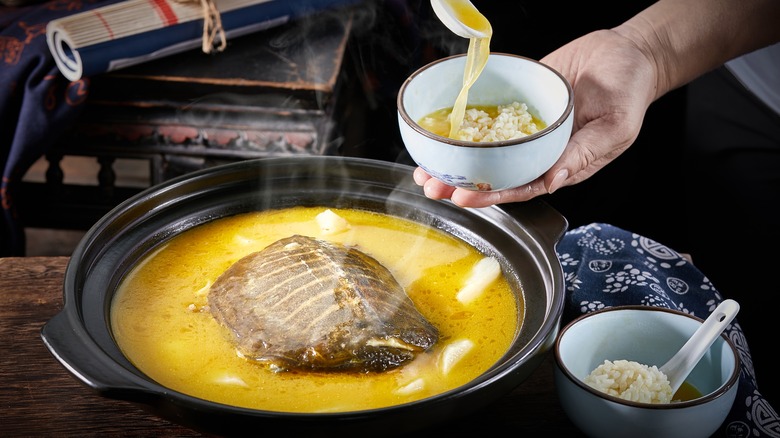The US President That Loved To Eat Turtle Soup
We may receive a commission on purchases made from links.
While turtle dishes are not commonly found on restaurant menus today, the meat of this animal was once very popular in the United States. Historical records show that turtle (also called terrapin) was part of the diets of Native Americans from the Mid-Atlantic all the way south through to Florida. Colonizers later adopted the abundantly-available meat, but it was mostly used as a cheap food source for enslaved peoples. In an unexpected twist, turtle meat would eventually become a delicacy for the upper class — and even several presidents.
Turtle soup in particular became a must-have at restaurants, social clubs, and hotels. The delicacy made its way into the White House as a favorite of President William Howard Taft, who held office from 1909 to 1913. The 27th president employed a special chef to solely make the soup, and a recipe was even named after him: "Taft's Terrapin Soup." It included veal, tomatoes, herbs, sherry, vegetables, hard-boiled eggs, and turtle meat.
The president insisted that his favorite soup should be enjoyed with champagne. The book "Diamonds in the Marsh: A Natural History of the Diamondback Terrapin" by Barbara Brennessel states that First Lady Helen Louise Taft would pay the chef extra to prepare the soup for state dinners. Soups like this one were based on Caribbean turtle recipes brought back from the West Indies by British soldiers, and American chefs adapted all the manner of turtle dishes to local tastes, using green sea turtles as well as prized diamondback terrapins.
The presidents who loved turtle soup (and what went into it)
William Howard Taft wasn't the only president who loved turtle soup. John Adams and his wife Abigail are rumored to have enjoyed it at the first Independence Day celebration in 1776, earning it the status of America's strangest 4th of July food tradition. George Washington also dined on it in 1783 at a farewell banquet for Continental Army officers. Pre-made shipments of the soup were delivered to the White House for Andrew Jackson during his tenure. And at Abraham Lincoln's 1865 inaugural celebration, terrapin was served as an hors d'oeuvre.
George Washington, along with fellow founding fathers Thomas Jefferson, Benjamin Franklin, and Alexander Hamilton, were even members of an elite men's club called the Hoboken Turtle Club. The group ate turtle and vegetable soup served with boiled eggs at each gathering. Boiled eggs and sherry actually have prominent places in any classic turtle soup recipe. A New Orleans version is tomato-based and thickened with a roux, whereas Baltimore-style turtle soup features cream and Madeira wine. The latter version was served at the Ritz hotel when it opened in 1908, cooked by famed chef Auguste Escoffier.
Turtle meat itself is described as having a robust, beefy texture. Its flavor is slightly gamey with a fish or seafood-like taste, like that of salmon, lobster, or crab. It's also been compared to veal, which is cooked along with the turtle in a veal broth in many recipes.
What ended the turtle soup craze?
Demand for turtle soup led to dwindling supplies and high prices. At one point, it was so popular that it was sold in cans by brands like Campbell's and Heinz, but the cost and difficulty in procuring turtles made the ingredient scarce. Overfishing first pushed green sea turtles to near extinction, followed by decimation of diamondback terrapin populations. In their place, snapping turtles were used as an alternative, while mock turtle soup made with calf's heads became a common substitute.
Another reason why turtle soup faded as time went on was the arrival of the Prohibition in 1920. When the 18th Amendment banned liquor in the U.S., it became all but impossible to legally make classic turtle soup, which relied on sherry or Madeira wine. By the time Prohibition was repealed in 1933, American tastes had changed, and the dish remained mostly off the menu.
Green sea turtles were declared an endangered species in 1973, and diamondback terrapins remain under threat, with laws regarding their protection and conservation varying from state to state. Even snapping turtles are in danger from over-harvesting, and bans or limits have been placed on hunting them. While some restaurants still offer authentic turtle soup as a throwback novelty, the meat is most likely farm-raised. In places like China, Japan, and Singapore, steamed softshell turtle is a no-waste delicacy, and turtle breeding farms supply meat to cut down on the threat of extinction.



